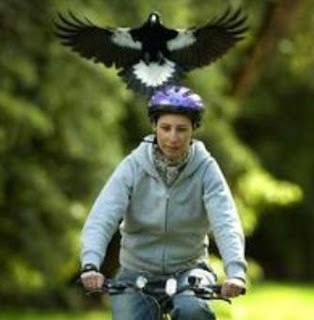
The other day as I was happily walking home from campus I saw a magpie hopping around on the grass in front of me and it prompted a life-changing chain of thought for me. I believed (incorrectly as it turns out) that magpies were part of that devious group of parasitic birds that sneak their eggs into other birds' nests so that they get out of doing all the work of raising their chicks themselves. Initially, I thought this was incredibly tricky and insidious of magpies, but the more I thought about it the more I came to the conclusion that magpies were really quite clever. See, magpies must realize that they would not be able to take care of the eggs themselves, so they give their eggs to other birds to raise. Also, I began pondering how dense other birds must be that they don't even realize the deception that took place. Think about it - what other mother could leave her children for a few minutes and come back to find that an extra child had mysteriously appeared and not even question it? Other birds must really not be too bright. Yep, I have definitely decided - if I were a bird, I would be a magpie.
After I had this whole illuminating train of thought which led to my self-discovery, I did some research about magpies and other birds and I found some interesting facts which I would like to share with you so that you, too, can be enlightened.
- First of all, I owe an apology to magpies. They do not, in fact, belong to the group of parasitic birds that lay their eggs in other birds' nests. In reality, they are shining pillars of parenthood in the bird community. After the baby birds are strong enough to begin moving about on their own, the parents even close up all the holes in the nest (thus imprisoning the babies) and feed them through little holes in the nest until the chicks are able to fly. This might seem cruel, but actually it's a precautionary measure for the babies' own good, as it keeps them from trying to fly off prematurely and falling to their doom.
- While magpies are not parasitic, there are a lot of other birds that are. Cuckoos, for one. These devious little birds will lay one egg in another bird's nest and then actually steal one of the mother's own eggs so that the mother doesn't notice a change in egg count. The whole substitution process takes less than 15 seconds. Not only that, but cuckoos are able to mimic the color and pattern of the eggs of whatever bird they choose to victimize so that the eggs all look the same. Scientists are still mystified by how the cuckoos are able to manage this.
- Another interesting parasite is the Honeyguide. When these chicks hatch they have a lethal advantage over the indigenous baby birds - they are born with a deadly hook-tipped beak, which they use to murder all the other babies. The beak even falls off a few days later after its purpose has been achieved, and the poor, dim-witted parent birds then devote all their time and energy to raising the Honeyguide chick that murdered their children.
- Another interesting bird is the black eagle. These birds always lay exactly two eggs, and the second egg is always doomed. One egg always hatches a few days before the other and so the first bird to hatch systematically pecks the second bird and steals all of its food until it finally succumbs to death. Interestingly enough, as I was writing this blog my family started to eat dinner and when I turned to the table after finishing the thought I'd been working on, I realized that my brother William, having finished his pork chop, had decided to devour mine as well. I have decided (and William even agreed) that if he were a bird he would be a black eagle. It's a wonder I ever survived my childhood.
- I would like to conclude with an uplifting bird to contrast the disturbing birds detailed above. Surprisingly, parrots are incredibly fair when it comes to feeding. Although the eggs all hatch over a period of about five days, the parrot babies are scrupulously fair and ensure that even the smallest baby bird gets it's fair share. The older, bigger babies will even share their ration with the younger birds to make sure that they all grow up strong. The result of this is that after about three weeks all the birds have roughly the same size and strength and its impossible to even tell which of the birds were the runts of the littler.
Dear Robyn,
ReplyDeleteI loved this. It was entertaining and educational. I'm kind of sad that magpies aren't the birds you thought they were.... oh well.
I like your blog and I'm looking forward to reading more of it.
Love, Jennnnnna